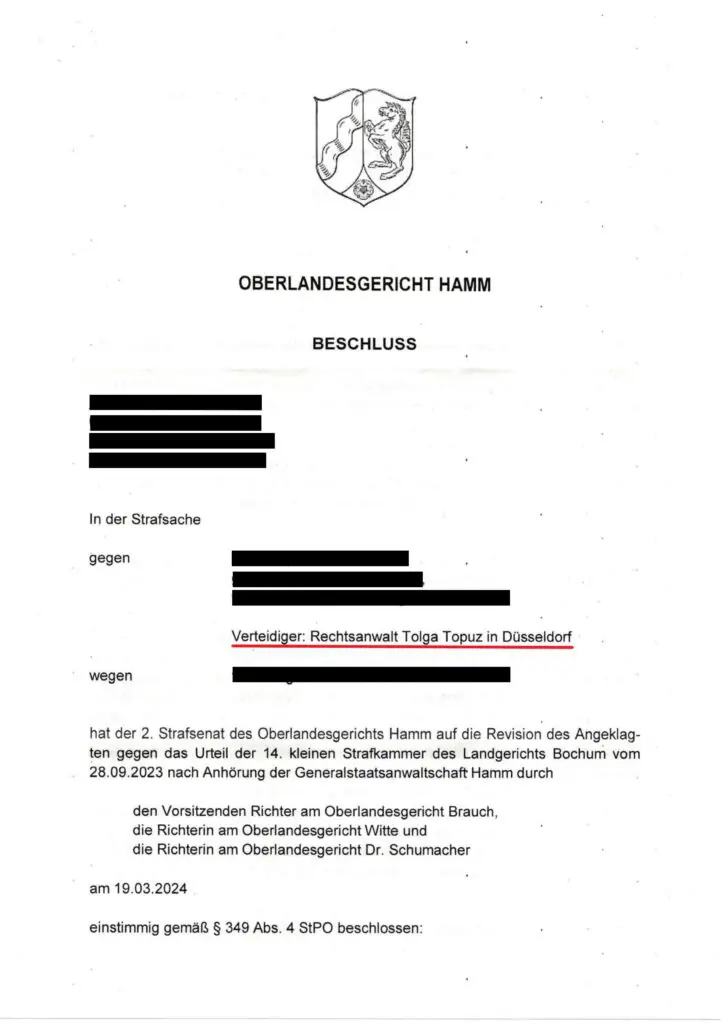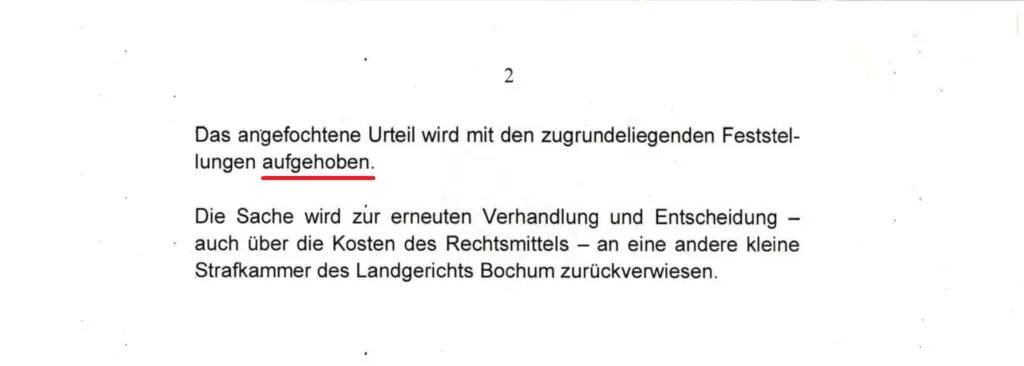The successful revision in criminal proceedings
-The supreme discipline of legal practice-
Appeal proceedings against a criminal judgement are often the last hope for those affected to escape the consequences of the judgement. This applies regardless of whether or not the actual conviction was "justified" from the perspective of the person concerned. The legal justification for an appeal is highly complex.
In der gerichtlichen Praxis haben weniger als 10 Prozent aller eingelegten Revisionen Erfolg. Die Statistiken sagen jedoch nichts darüber aus, wie die Erfolgsaussichten im konkreten Einzellfall zu bewerten sind.
Here is an example of a successful revision from our practice:


In dem von uns übernommenen Fall wurde unser Mandant in zwei Instanzen (1. Instanz: Amtsgericht Wanne-Eickel; 2. Instanz: Landgericht Bochum) für eine Tat verurteilt, die er nie begangen hatte.
Die Ausgangsgerichte verurteilten den Angeklagten, welcher noch nie strafrechtlich in Erscheinung getreten war, allein auf Basis der Aussage eines Polizeibeamten des Polizeipräsidiums Bochum, obwohl der Angeklagte einen Entlastungszeugen präsentieren konnte, der den Ausführungen des Polizeibeamten widersprach.
Im Rahmen einer fast dreißigseitigen Revisionsbegründungsschrift haben wir sämtliche Rechtsfehler, die das Ausgangsgericht begangen hatte, „juristisch sauber“ herausgearbeitet und dem Strafsenat gegenüber dargelegt.
Unser Engagement zahlte sich am Ende aus. Der zuständige Senat des Oberlandesgerichtes Hamm schloss sich unserer Rechtsauffassung an und hob das streitgegenständliche Strafurteil auf.
Zu unserem Selbstverständnis gehört es, dass wir unsere eigene Statistik machen, unabhängig davon, wie „schlecht“ die Chancen zu stehen scheinen.
A glance at the current statistics does not reveal that a large number of appeal proceedings are initiated in order to delay the entry into force of a criminal judgement. By proceeding in this way, a lawyer buys his convicted client more time, as the penalty only has to be paid or incurred once the actual criminal proceedings have been "finally" concluded and have thus become "unassailable". The existence of a final judgement is a basic prerequisite for the subsequent enforcement proceedings.
The following article provides an overview of what the appeal procedure actually is and what special features need to be taken into account:
I. Was ist die Revision?
In addition to an appeal, a revision is an (ordinary) legal remedy. This means that a higher court reviews the disputed court decision.
Im Gegensatz zur Berufung beschränkt sich der Prüfungsumfang bei der Revision lediglich auf Rechtsfehler. Daraus folgt, dass das Revisionsgericht keine neuen Beweise erhebt, sondern die Prüfung lediglich darauf beschränkt, ob das Ausgangsgericht das Gesetz auf den von ihr „festgestellten“ Sachverhalt richtig angewendet hat bzw. ob die Urteilsfeststellungen überhaupt eine tragfähige Grundlage für die Überprüfung seitens des Revisionsgerichts bieten.
The situation is different on appeal. The court of appeal takes evidence again, assesses the results of the evidence independently and reaches a "new" decision.
II. When is the appeal admissible?
Die Revision ist statthaft gegen Urteile der Strafkammern (am Landgericht), der Schwurgerichte (am Landgericht) sowie der im ersten Rechtszug ergangenen Urteile der Oberlandesgerichte (§ 333 StPO).
In addition, a further appeal (Section 335 of the StPO) against decisions against which an appeal is admissible is also permitted. An appeal is generally admissible against judgements by the criminal judge (at the local court) or the lay assessor's court (at the local court), so that convicted persons have the right to "waive" the appeal and lodge an appeal directly with the competent higher regional court.
III What deadlines must be observed?
1. Frist zur Einlegung der Revision
Die Revision muss nach § 341 Abs. 1 StPO grundsätzlich innerhalb einer Woche nach Verkündung des Urteils schriftlich oder zu Protokoll der Geschäftsstelle eingelegt werden.
The revision must be filed by the defendant himself, by an authorised representative or by the defendant's defence counsel.
2. Frist zur Begründung der Revision
Die Frist zur Begründung einer eingelegten Revision beträgt a Monat und beginnt –in der Regel– mit Zustellung des Urteils (§ 345 Abs. 1 S.1 und 3 StPO). Unter bestimmten Voraussetzungen kann es zu einer Verlängerung der Begründungsfrist kommen.
IV. Course of the revision procedure
Once the grounds of revision have been submitted in due form and time, the Public Prosecutor General's Office (for appeals before a Higher Regional Court) or the Federal Public Prosecutor General's Office (for appeals before the Federal Court of Justice) is given the opportunity to submit a statement.
As a rule, the latter applies for the revision to be dismissed as inadmissible or manifestly unfounded.
The application of the Public Prosecutor General's Office or the Federal Public Prosecutor General's Office is communicated to the appellant for reasons of the right to be heard. The appellant may submit a corresponding counterstatement.
V. Possible decisions of the court of revision
Hält das Revisionsgericht die Vorschriften über die Einlegung der Revision oder die über die Anbringung der Revisionsanträge für nicht beobachtet, so kann es die Revision durch Beschluss als unzulässig verwerfen.
Hält das Revisionsgericht die Revision einstimmig für offensichtlich unbegründet, kann es die Revision durch Beschluss verwerfen.
Hält das Revisionsgericht die eingelegte Revision einstimmig für begründet, so kann es durch Beschluss, wie in unserem Beispielfall geschehen, das Urteil des Ausgangsgerichts aufheben und die Sache zur erneuten Verhandlung und Entscheidung zurückverweisen. Unter bestimmten Voraussetzungen kann das Revisionsgericht auch selbst entscheiden und den Angeklagten sogar freisprechen.
In all other cases, the court of revision decides by judgement. In practice, judgements in appeal proceedings are extremely rare.
IV. Conclusion
Those affected who wish to defend themselves against a criminal judgement must be quick and contact a lawyer as soon as possible.
Statutory time limits exist for both appeals and revisions. If such a deadline is missed, there is usually no realistic possibility of having the disputed judgement reviewed by a court.
Affected parties who wish to defend themselves against a criminal judgement should contact our law firm at short notice. We will discuss the possible next steps and the financial terms of our mandate in a telephone call at short notice.
Tolga Topuz
Lawyer
Topuz Law - Law firm from Düsseldorf -


